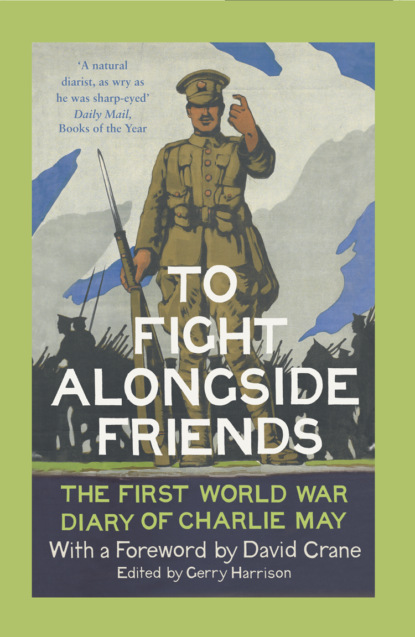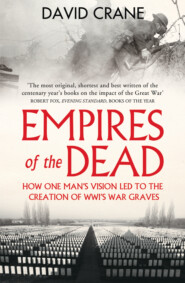По всем вопросам обращайтесь на: info@litportal.ru
(©) 2003-2024.
✖
To Fight Alongside Friends: The First World War Diaries of Charlie May
Настройки чтения
Размер шрифта
Высота строк
Поля
It would be as late as October 1915, by which time the 22nd were at their final camp on Salisbury Plain as part of Major General Sir William Fry’s 30th Division, before the artillery could even start firing practice or their Lee Enfield rifles and machine guns arrive. If May’s diaries from France are anything to go by, he would have taken the frustrations in his stride. With six years’ experience in the King Edward’s Horse behind him he had received his commission back in January, and he was a company commander when, in the middle of November 1915, after a last few days’ leave to see his wife and sixteen-month-old daughter, Captain Charlie May and the 22nd Battalion finally embarked from Folkestone for Boulogne.
The war that Charlie May had been trained for was not the fluid conflict of retreat and advance that the BEF had known in 1914 but the war of trenches that is how most of us now think of the First World War. In the popular memory the year 1915 seems almost like a pause between the heady optimism of the opening weeks of war and the slaughter of the Somme, but while May and the 22nd were shuffling from camp to camp – Heaton Park, Morecambe Bay, Grantham, Lark Hill – and progressing from longish ‘walks’ to bayonet and bomb practice, the bloody failures of Aubers Ridge, Festubert and Loos were teaching a bereaved nation the appalling reality of warfare along the 475 miles of earthworks and trenches, stretching in an unbroken line from the Channel to the Swiss border, that we know as the Western Front.
It was to this static, troglodytic war of attrition, mud, rats, sleeplessness and endurance that May was bound and it is as they finally set off for France that his diary begins. In the last two or three years of peace Charlie May had begun to establish himself as a journalist and writer, and the diary is unmistakably the work of a born story-teller, a man with a lyrical sense of place, an ear for dialogue, a gift for rapid and vivid characterisation, a taste for the incongruous and a need to record what he saw and experienced. ‘One gets into a habit, quite unconsciously at first, of any hold it may subsequently get on one,’ he was confessing less than a month after landing in France. ‘For instance, here did I set out, gaily and with no foreboding, upon this diary, never thinking it could become a tyrant that would ’ere long rule me, and here I am reduced to impotence when evening comes round, unable to refuse the call of these pages to be scribbled in … But fill it I must, this habit has me so in its grip.’
Charlie May’s war diaries survive insevensmall, wallet-sized pocket books, written in faint pencil in his neat but tiny, italic hand, as a rich and vivid testament to this compulsion. At one level it seems rather curious that an officer of his dedication should indulge in something so defiantly in breach of King’s Regulations, but we can be grateful that he did because the result is an account that had never seen the censor’s eye, a vivid picture of battalion life in and behind the trenches during the build-up to the greatest battle fought by a British Army.
The friendships and tensions, the homesickness, frustrations, delays and endless postponements, the fog of ignorance, the combination of boredom and terror that every man who has ever fought could testify to, the relationship of officer and batman, the almost incomprehensible contrast of the pastoral world only miles behind the fighting and the scarred and pocked ugliness of the front line – all familiar enough, perhaps, but seen and recorded here with a freshness that brings them home as if for the first time. ‘This war, I am sure, is one of the most peculiar the world has ever known if, indeed, it is not the most peculiar,’ he writes of the surreal experience of facing an enemy you mightnever see,
In no other can it have been possible to soldier so long, to witness such evidence of the presence of an enemy and of his ability to injure without ever catching sight of beast, bird or man belonging to him … Except through my glasses, I have never yet seen a Fritz – an experience in no way peculiar, since it has been experienced by many a thousand others of double my active service.
There is a visceral immediacy about a war diary – a question mark hanging over each entry, the unspoken possibility that it might be the last – that no retrospective account can quite match. But the main fascination of these pages remains Charlie May himself. There is material here – details of units, movements, coded map references (which have been omitted from the text) – that would plainly never have got past an Army censor, but it is the absence of self-censorship that makes these diaries so compelling and disarming a portrait of the archetypal English ‘Everyman officer’ – ‘a truly ordinary sort of clout-head’ as he describes himself – shorn of all the reticences and defences behind which he traditionally hides.
There is no cynicism or pretence in these pages, no attempt to make things sound better or worse than they are, or to dissemble the depth of his feelings for the men under his command or the wife and daughter to whom his diary is addressed. In Robert Graves’s Goodbye to All That, any talk of ‘patriotism’ was fit ‘only … for civilians, or prisoners’ and any new arrival would soon have it knocked out of him. Underscoring every page of May’s diaries, however, is an unembarrassed pride in his country and an almost maternal affection for the Englishmen with whom he is privileged to fight.
It has its ‘little Englander’ side – ‘I can’t imagine why the Germans want this country,’ he quotes one of his messmates on the irredeemable squalor of the ‘hairy, dirty, baggy-breeched’, sabot-wearing French peasant; ‘If it was mine, I’d give it to them and save all the fuss’ – but in nothing is he more an Englishman of his time than in his less attractive prejudices. He can write very movingly of the shattered lives and homes that they come across in the villages behind the front lines, but he only has to see or smell another French midden to feel a sudden, nostalgic, humorous tug of affection for ‘Dear, old, tax-ridden, law-abiding England!
How I would delight to see one of your wolf-nosed sanitary inspectors turned loose in this, our Brucamps. How you would sniff, how snort, how elevate your highly educated proboscis! … And how masterly indifferent would our grubby people be of you, how little would they be impressed, how hopelessly insane they would think you, and what grave danger there would be of a second Revolution if you or any untold number of you essayed to remove from them their beloved dung-heaps.
It is the same with the ‘British Tommy’. He might lose his kit as soon as look at it, he might need ‘booting along’ or a good ‘strafing’ – May’s favourite word – he might get drunk, he might be ‘something of a gross animal’, but ‘God knows he has enough to put up with. And I cannot help but love him.’
‘Men dropped by the road side exhausted,’ he writes in one wonderfully evocative passage,
Others staggered pitifully along in bare feet, the mud having snatched both boots and socks from them. Others again went strong, chattering and laughing whilst among the lot the officers, those of us whose strength was equal to it, went in and out carrying a rifle for this man, giving a cigarette to another, helping a lame duck up on to his poor, swollen feet again and chaffing or cracking feeble jokes with them all … It was a dark night. Men were but shuffling shadows against the chalk mud of the roadway except when the lights went up from the lines all about us. Then you could see the huddled forms of tired, mud-caked Englishmen shuffling home from their labours. The war is a war of endurance. Of human bodies against machines and against the elements. It is an unlovely war in detail yet there is something grand and inspiring about it. I think it is the stolid, uncomplaining endurance of the men under the utter discomforts they are called upon to put up with, their sober pluck and quiet good-heartedness which contributes very largely to this. All the days of my life I shall thank God I am an Englishman.
It does not stop him grumbling at all the usual targets of the infantry officer – the staff officer with nothing but a public school to recommend him, the deliberate idiocy of the censors, the base camp shirkers who would be all the better for a week in the trenches, the public at home querulously wondering why the Army isn’t ‘moving’ – but nothing in the end can dent his faith. It is possible that had he lived to see where his blind confidence in the build-up to the Somme led he would have shared in the general disillusion, but any man who can extract comfort out of Loos or the disastrous fall of Kut or ‘Thank God for the Navy’ a week after Jutland is probably proof against anything that even the Great War can throw at him.
There was nothing abstract about May’s patriotism; that was the strength of it. It was embodied in the men he was fighting with – in Bunting, his loyal batman, who had pulled him out of the canal when drunk one night in Manchester; in the puzzling Richard Tawney who, for whatever reasons of his own, went on refusing a commission; in the ‘pitiful sight’ of ‘Poor English soldiers battered to pieces’; in ‘Gresty … a good man and one whom we liked well … his poor body full of gaping holes’ – and it made May want to fight. ‘Do those at home yet realise how their boys go out for them?’ he asked,
Never can they do enough for their soldiers, never can they repay the debt they owe. Not that the men ask any reward – an inviolate England is enough for them, so be it we can get our price from the Hun. Confound the man … But one day we’ll get at him with the bayonet. The issue must come at last to man to man. And when it does I have no doubt as to the issue. We’ll take our price then for Gresty and all the other hundred thousand Grestys slain as he was standing still at his post.
It needs to be remembered that the 22nd was also the ‘7th City Pals’, and the strong friendships and loyalties around which the whole concept of the Pals battalions had been initiated made such losses seem more painful still. By the time that the Battle of the Somme began, the battalion formed in November 1914 had of course changed with time, deaths, promotions and new arrivals out of all recognition, but one only has to look at the parallel accounts of May’s old comrades from the Morecambe, Grantham and Lark Hill days – fascinatingly incorporated here as footnotes to his own diary entries to add fresh perspectives – to feel how strong were the bonds formed in England in a battalion like the 22nd and how bitterly the losses were mourned. ‘Tonight we had a little reunion of all the old boys,’ May himself wrote just a week before the Somme began,
There was the doctor, Murray, Worth, Bill Bland, ‘Gommy’, Meller and myself and we sat round a table and sang the old mess-songs … It was tip-top and we all loved each other. There are so many new faces with us now and so many missing that the battalion hardly felt the same – and one cannot let oneself go with the new like one loves the old boys. I would that the battalion was going over with all its old contingent. How certain we should all feel then. Not that the new stuff is not good. But we knew all the others so well.
Above all though, for Charlie May, England was his wife Maude and their baby daughter Pauline; his diary is an extended and deeply moving love-letter to them. He had married Bessie Maude Holl in February 1912 when they were both twenty-three, but it was really only when he had to leave her and their new daughter, that they both seem to have realised – not how much they had loved each other, that never seems to have been in any doubt – but how astonishingly fortunate they had been in their brief, shared lives. ‘I thought of you as we strolled there, Lizzie with her reins slack wandering where she would and at her own pace,’ he wrote after one afternoon spent riding through a world of larch and birch clumps and wood pigeons still untouched by war – a passage in which images of Maude, England and a deeply felt sense of natural beauty fuse into one to take us as close as we can probably get to what it was that Charlie May was ready to fight and, if necessary – un-heroically, reluctantly but matter-of-factly – die for.
And I longed that you could have been with me, for I know how you would have loved it and how happy we two would have been. The green rides of Epping came back to me in a flash. You in that black spotted muslin dress you used to wear looking cool and lovely so that I just asked nothing more than to walk along and gaze at you dumbly, like any simple country lout gazes at his maid.
‘I do not want to die,’ he wrote; the thought of never seeing Maude again, of his daughter growing up and never knowing him, turned ‘his bowels to water’. But as the sporadic tours in the front-line trenches and the training behind the lines intensified in the build-up to the expected great summer offensive of 1916, there became less and less room for the ‘personal’. It is impossible to read these diaries and the first casual mention of the Somme without a sense of grim foreboding, and yet at the same time there is no missing the growing excitement at the approach of battle, at the movement of troops, the massing of guns in preparation for the preliminary bombardment and the submersion of the individual in a mighty collective whole. ‘It is marvellous,’ he wrote, ‘this marshalling of power. This concentrated effort of our great nation put forward to the end of destroying our foe. The greatest battle in the world is on the eve of breaking. Please God it may terminate successfully for us.’
There had been ominous warnings for the 22nd in the weeks leading up to the Battle of the Somme – a night raid with heavy casualties that showed the German wire uncut by the artillery, dud shells and ‘whispers’ that ‘our ammunition … is not all that it should be’ – but the grief that the word ‘Somme’ would conjure up for thousands of families whose sons had flocked to enlist in the autumn of 1914 belongs to retrospect. To Charlie May the word meant only a glimmering river – ‘full of sport’, he thought it should be, as he set off to buy his fishing tackle in Corbie – idling quietly through a landscape of ‘tiny panoramas’ of bullrushes and pampas grass, of ‘brown trees, blue, sparkling waters, white, brown, red, blue and purple houses clustering around their grey churches’. The larger picture, the overall strategic concerns and aims that lay behind the Somme offensive of July 1916 – Verdun, the Eastern Front, the eternal illusion of a ‘break-through’ – were of no concern. His Great Battle – the battle that would mark ‘the beginning of the end’, he told Maude on 15 June – would be what he called the ‘Battle of Mametz’, and his responsibilities were to the men around him and the wife and daughter who were never out of his thoughts.
On the morning of the first of July, after a week of preliminary bombardment, the 22nd were part of the 7th Division, and their sector lay opposite the heavily fortified village of Mametz, on the southern edge of the Germans’ Fricourt Salient, east of Albert. On their left the British line stretched up northwards through names that would soon be seared into the national consciousness – Fricourt, La Boisselle, Thiepval, Beaumont-Hamel – and on their right, eastwards and south to Maricourt, the junction with the French army and the River Somme itself. But for the company commander of B Company, the war had shrunk to the ‘900 yards of rough ground’ in front of him and the inner battle to live up to the standards he had set himself. ‘My one consolation,’ he wrote to his wife, in one final, simple and binding credo,
is the happiness that has been ours … My darling, au revoir. It may well be that you will only have to read these lines as ones of passing interest. On the other hand, they may well be my last message to you. If they are, know through all your life that I loved you and Baby with all my heart and soul, that you two sweet things were just all the world to me. Pray God I may do my duty, for I know, whatever that may entail, you would not have it otherwise.
The diary would be the last word she had from him. He did his duty, and so, too, did the battalion of whom he was so proud. ‘They are all so clean-cut and English as you know so well, my own,’ he had written to his wife on the eve of their departure for France; ‘I feel confident they’ll go when the chance comes. Please God the 22nd may carry the old Regiment’s name another rung up the ladder of fame.’ His soldier’s prayer was answered. If his optimism in the prosecution of the war was unfounded, his confidence in the courage of his men was not. He would not live to know it – his last moments are preserved here in his wife’s desperate, unbearable need to know every detail of his end – but Mametz was taken and, almost uniquely, the battalion’s targets all met. It had been, though, at a shocking price. Of the 796 officers and men of the ‘7th City Pals’, 472 were either killed or wounded on that terrible 1 July, a day that would cost the British Army 19,240 dead and 57,470 casualties in all. May’s Battle for Mametz was over but the Battle of the Somme had only begun.
David Crane
February 2014
Prologue (#ulink_16dfeadb-4e99-5e1b-81cc-550c8d968afa)
‘A pippy, miserable blighter’ (#ulink_16dfeadb-4e99-5e1b-81cc-550c8d968afa)
7–10 November 1915
Lark Hill,
7th November ’15
I am going to commence this book this evening because now I have seen you for the last time before going abroad and I will therefore be unable to make [a] personal confession to you again for some time to come.
I arrived back here depressed from my leave-taking from you and Baby and found little to ease the sadness of my soul. More than half our fellows are out and the mess is full of the 23rd men, come over to say ‘goodbye’.
You know how little I love them and tonight they put me in no mood to reconsider my affection. Some are singing ragtime with deplorably poor success, whilst the remainder talk ‘shop’ in loud and raucous tones. They are hateful people and I wish they would go home and allow us to make our final arrangements in peace and quietude.
Our kits have all to be on the transport wagons by 6.15 a.m. tomorrow and we follow on Tuesday. I will be jolly glad when we get on the move, as will all the rest of our fellows. We believe we are bound for St Omer. I wonder!
I wrote to you this evening but not at length because I could not. I’m such a pippy, miserable blighter that it would be a sin to convey it to you, and just when you will want bracing up.
Guillet was in this afternoon with his bride.
They looked very well and appeared very happy. It quite reminded me of our honeymoon. By gad, my sweetheart, what happiness has been ours! It seems wonderful to me to look back upon.
8th November ’15
Had a final inspection of the men this morning, checking rifles and bayonets principally. They will get them mixed up though their innocence of any such thing is simply sublime. I had to ‘strafe’ them a bit come the last and have promised them the most diabolical punishments if they get up to the same tricks at the front. They seemed rather pleased than otherwise. But they are like that. Promise them a regular hell of a time in France and you can’t please them better. Their keenness to go is marvellous and I trust it will hold when they get there. They are topping fellows and I do hope we can bring the most of them back with us.
This afternoon the CO declared a half holiday as B and C Company were playing off the battalion final at soccer.
It was ‘some’ match. Rivalry ran terrifically high and we all expect to hear of several fights tonight. B lost 1–nil. It was a splendid game, the best any of us have seen on the Plain. The men were simply wild about it, and I am afraid it cost a certain company commander, who ought to have known better, rather more hard cash than he cares to think about in cold blood.
The mess is in great form tonight. Everyone is in except the CO, Merriman and Knudsen,
who are all three spending this last evening with their wives. They have their farewells yet to do. I do not envy them, poor chaps, nor their womenfolk. Mrs Knudsen was up at the match this afternoon and I got her to give the prizes. She came into the mess afterwards and wished us all goodbye. It was rather an ordeal for her. We promised to bring [her husband] back safely for her and I sincerely trust we shall.
All our fellows are in hilarious mood, singing and joking no end. They are a grand lot and as I look at them I can’t help feeling proud of our old battalion and the men who’ve made it. They are all so clean-cut and English as you know so well, my own, I feel confident they’ll go when the chance comes. Please God the 22nd may carry the old Regiment’s name another rung up the ladder of fame.
They have me on to make a bit of a speech tonight at mess when proposing the King’s health. I wish they wouldn’t do these things. It is one of the chief trials a senior officer has to face. I always make such a hash of speeches. Go red and hum & hah and generally look a perfect ass. However, ‘faint heart never won fat turkey’, so I shall have to go through with it.
All the transport has gone now with the machine gun[s] etc. Our kit has been taken with the former so we are reduced to what we stand up in and must endure the horrors of a floor-board couch for the first time for some months. There is some proverb about hard work softening the roughest couch, I believe. I am unfortunate. I have had an easy day.
9th November ’15
We have not gone yet. That is the one and only item to be recorded today … Yet how near we were!











